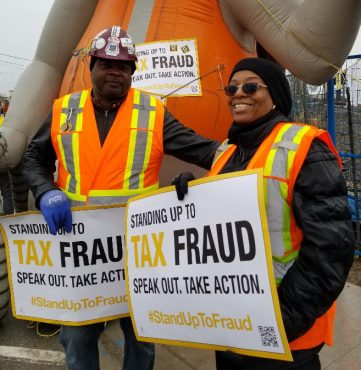
John Bleasby
Carpentry unions attack the underground cash economy across North America
Canadian ContractorTax fraud and consumer vulnerability are only two of the problems
[This article ranked No. 1 on our list of most commented on pieces from 2019.]
The underground, work-for-cash economy can be a challenge for legitimate contractors. Prospective clients may ask for cash discounts. Aggressive competitors in turn may offer them. It’s a problem that persists regardless of the business cycle. When times are busy, there’s a flurry of new entrants to the industry, each eager to outbid one another on projects. When times are slow, the work-for-cash economy takes root as a way to keep business rolling. The issues raised are many, including tax fraud, fair wages, and liability.

Payments made under-the-table mean lost tax revenue, unfair wages, and increased liability risks
The cost of the underground economy is enormous
In a joint statement, the Carpenters’ District Council of Ontario (CDCO) and the United Brotherhood of Carpenters and Joiners of America (UBC) referenced a Prism Economics and Analysis report suggesting that between $1.8 and $3.1 billion is lost annually in Ontario alone through the tax fraud resulting from the underground economy. “When tax fraud takes place, it prevents the employees of contractors who partake in unfair practices from gaining eligibility for workers compensation, unemployment, and from contributing to personal retirement plans and social security,” the statement said. “This is also what leads to money being taken from public funds designated for items like healthcare and social services.”
Awareness events took place in 70 North American cities
A movement to deal with the problem has emerged in a united, continent-wide front. The CDCO and the UBC staged events coast to coast in both countries on April 15 to draw attention to what they call the “tax fraud and proliferation of the underground economy in the construction industry.”
“There were well over 70 cities involved,” Mike Yorke, President of the CDCO, told Canadian Contractor. “It started at 6am on the east coast of Canada in Newfoundland with banners, and just rolled across North America throughout the day.” Halifax, Toronto, Waterloo, and Edmonton were other Canadian locations where coordinated events took place.

Anti-Tax Fraud protests on April 15 started in Newfoundland and spread to over 70 cities in North America
In Toronto, a four-stage approach
Yorke described the strategic events in Toronto that started at daybreak. “We were at a non-union job site, coincidentally a Canada Post project, at 6:30 in the morning, marching with banners,” he said. “We had determined over three or four weeks that there were a lot of workers there being paid under the table, straight cash. Then we did a press release at Toronto City Hall at 10am. In the afternoon we were out at the Scarborough Town Centre to talk to the public. After that, we met with the federal Minister of Finance. We did the full spectrum.”
The public dialogue was important because, as Yorke pointed out, it’s not just unpaid taxes that impact the government’s ability to pay for public services. “There is also a huge liability for the homeowner. If they do not use a legitimate contractor, there’s going to be a whole list of health and safety violations, and potential damages if someone is injured on the job. Homeowners have a huge responsibility that they may not be aware of. That’s why they need a legitimate contractor who can defend their interests.”
The contractor you want and the one you don’t
There’s a saying that summarizes the conundrum faced by homeowners; “The contractor you want is booked for the next six months. The contractor you don’t want can start tomorrow.” An example of this is played out in Season 8 of Shameless (available on Netflix). Twenty-eight year old Fiona has gone out on a financial limb to buy a small, run-down apartment building on the south side of Chicago. She’s a complete novice as far building management goes. The roof needs repair. She calls up a roof repair company — basically two guys in a pickup. They quote Fiona $750 to re-tar the roof and repair some flashing. She bids them down to $500 cash. However, they are not insured, not licensed, they don’t observe any safety protocols, and there’s nothing in writing — all Fiona has is a cellphone number. One of the two workers falls off the roof and breaks his leg. He sues Fiona for $6 million.
Aiming for a national policy
The ultimate goal for the Yorke and the CDCO is an actively enforced national Fair Wage Policy, something the City of Toronto has but Canada does not. “Part of our continuing dialogue with the Federal government is about implementing and establishing a Fair Wage Policy. We’ve used Toronto as an example to our Federal ministers.”
Got feedback? Make your opinion count by using the comment section below,
or by sending an email to:
JBleasby@canadiancontractor.ca
Follow John on Instagram and on Twitter for notifications about his latest posts

Advertisement
Print this page

Hard to understand the union
As soon as they run out of work their trades people start working under the table for cash
They want it both ways
That’s rich. Half their membership is doing side jobs for cash.
“Carpentry unions attack the underground cash economy across North America”, I’m surprised that they stand up against a problem which they are creating. Such organisations are comparable with communism, they want to control the wages, how many hours are allowed to work and how high the contribution has to be.
Unpaid taxes are only secondary to them, important are their salaries.
The Union shows only strength as long as the economy is running smoothly, ones there is a bit of down turn they are very quiet.
I’ totally against the “under the table” industry, perhaps unfortunately everything is taxable except laziness, therefore I would support a fair tax up to 55 – 60 hours per week, everything above should be tax free.
I agree with the stance on undocumented cash jobs and the hazards that go with it. It is unfair to legit businesses when this takes place.
However, one must also consider the following:
Homeowners are often the drivers in a for-cash system, as they want to pay as little as possible.
Are the unions really interested in having work places be legit, or are they again looking for job security? In a non-union environment the only job security is to do the job well, on time, and on budget. No dogging or taking longer because they can.
Lastly, how about the governments actually use less tax money on wasteful things like pipelines in China, and then they would need less of our tax dollars.
That’s great. I’ve been speaking against the underground economy for many years because it doesn’t help anyone in business regardless if that is in the trades or other. However, I find it most interesting when on a flight and speaking with illegal immigrants/aliens who have been working in the construction trade of carpentry for 7 and 11 years respectively for the union in Ontario (more specifically). Does that mean that the unions are also going to be able to open their books as to who is actually a Canadian and legally able to work in Canada – also? Or is this all just a red herring? Best regards, your colleague in the trade, self-employed and on the last chapter.
Unions are touted as the greatest of all evils according to the emails I’ve seen responding to this article, but without unions workers rights would have never existed. Like it or hate it, unions have provided guarantee of fair wages for work performed, benefits, pensions, and a measure of security that is only truly guaranteed if you are ready, able and available to work. Nobody wants a slacker on a job site, and those who think they just won the union lottery will find themselves on the list, but bypassed on jobs where the worker’s reputation for poor performance precedes him/her.
Unregulated licensed carpenters is really my beef. The industry needs to be regulated and bring the standard of care and quality into play if you want to get rid of the cash economy. It’s discouraging for many quality carpenter/contractors who are charging a fair and reasonable price to be undercut by wannabe carpenters/handymen who couldn’t read the Building Code let alone build to it. It made Mike Holmes lots of money fixing messes by guys like that, however it’s a great illustration of a much needed change on this side of the industry.